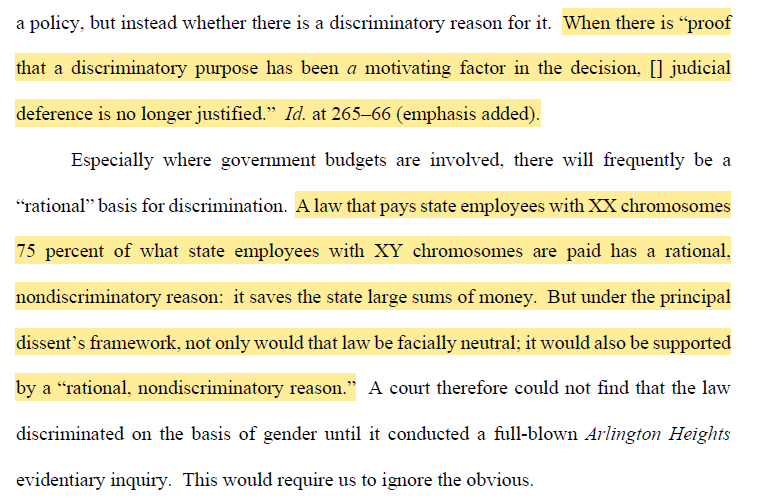News
Susan Collins lambasted by LGBT groups for Kavanaugh support
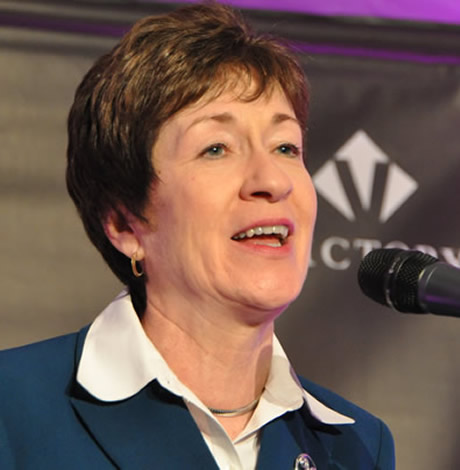
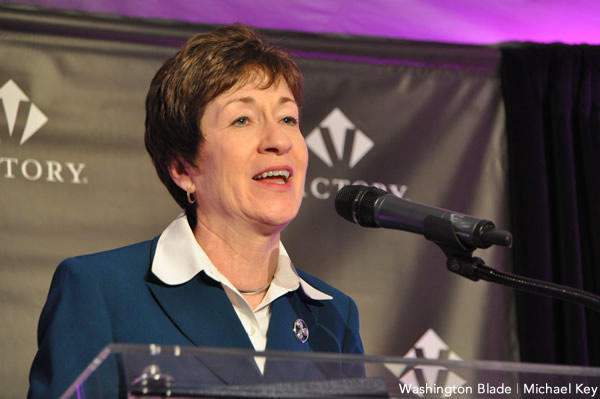
Sen. Susan Collins (R-Maine) declared her Brett Kavanaugh support in a Senate floor speech. (Washington Blade file photo by Michael Key)
Chad Griffin, president of the Human Rights Campaign, said in a statement “we are deeply disappointed in Sen. Collins today” after her speech on the Senate floor affirming support for Kavanaugh.
“In one of the most consequential vote of her lifetime — and of her constituents’ lifetimes — she has opted to back a dangerous, unqualified nominee who repeatedly lied under oath and has multiple credible allegations of sexual assault,” Griffin said. “The harmful consequences of Sen. Collins’ decision to support Brett Kavanaugh will last decades.”
With Collins’ support, Kavanaugh has the necessary votes for confirmation to the U.S. Supreme Court. Sen. Joe Manchin (D-W.Va.), another undecided senator, declared he’d vote for Kavanaugh shortly after Collins’ speech.
Griffin urged voters to demonstrate their anger with Collins by taking to the polls in the congressional mid-term elections and voting out senators who support Kavanaugh.
“In the wake of this news, there is only one course of action,” Griffin said. “The millions of Americans who have fought a valiant struggle against this despicable nominee must make their voices heard in November and beyond by electing lawmakers who will stand up for our rights rather than sell us out.”
In years past, the Human Rights Campaign has endorsed Collins when she was up for re-election and faced Democratic challengers because of her support for LGBT rights initiatives, including “Don’t Ask, Don’t Tell” repeal and the Employment Non-Discrimination Act. It’s hard to see how that support will continue in the Kavanaugh vote.
Collins declared in a floor speech she “will vote to confirm Judge Kavanaugh” hours after she was among the 51 senators to vote for cloture to allow the Senate to move forward with the nomination.
In response to Christine Blasey Ford’s Senate testimony asserting a 17-year-old Kavanaugh sexually assaulted her in 1982 when she was a teenager, Collins said the accusation isn’t enough to preclude the nominee from sitting on the Supreme Court.
“Fairness would dictate that the claims at least should meet the threshold of ‘more likely than not’ as our standard,” Collins said. “The facts presented do not mean the Professor Ford was not sexually assaulted that night or at some other time, but they do lead me to conclude that the allegations fail to meet the ‘more likely than not’ standard. Therefore, I do not believe that these charges can fairly prevent Judge Kavanaugh from serving on the court.”
Amid concerns Kavanaugh would vote to reverse the 2015 U.S. Supreme Court for marriage equality, Collins said Kavanaugh indicated he wouldn’t overturn the decision in his confirmation hearing. (LGBT legal experts have said his responses were wholly unsatisfying.)
“Others I’ve met with have expressed concerns that Justice Kennedy’s retirement threatens the right of same-sex couples to marry,” Collins said. “Yet Judge Kavanaugh described the Obergefell decision, which legalized same-gender marriages, as an important landmark precedent. He also cited Justice Kennedy’s recent Masterpiece Cakeshop opinion for the court’s majority, stating that, ‘The days of treating gay and lesbian Americans or and gay and lesbian couples as second-class citizens who are inferior in dignity and worth are over in the Supreme Court.'”
Marriage equality is but one LGBT rights issue. Other LGBT-related cases that may come to Supreme Court with Kavanaugh on the bench including litigation challenging President Trump’s transgender military ban, whether federal civil laws against sex discrimination applies to LGBT people and whether “religious freedom” affords a right for individuals and businesses to discriminate against LGBT people.
Sharon McGowan, legal director for Lambda Legal, also criticized Collins, saying the senator’s rationale for supporting Kavanaugh ranges “from naïve to disingenuous” and “can only be described as magical thinking.”
“Furthermore, her discrediting of Dr. Christine Blasey Ford’s (and others’) allegations against Brett Kavanaugh speaks far more loudly than the empty words she offered in support of sexual assault survivors, and her reliance on an incomplete and politically manipulated investigation to justify her decision was shameful,” McGowan said. “By relying on fantasy instead of fact, and by putting party ahead of people, Sen. Collins is apparently willing to ignore the overwhelming majority of Mainers who have urged her to oppose this nomination in order to avoid the ire of Republican Party bosses and the White House.”
District of Columbia
As You Are bar closes temporarily, citing problems with building
Shutdown comes two months after fundraising appeal brought in $170,000

As You Are, the LGBTQ café and bar located in the Barracks Row section of Capitol Hill near the Eastern Market Metro station, has announced on its Instagram page that problems associated with its building at 500 8th St., S.E., forced it to “temporarily” close on April 8.
“As you may be aware, As You Are’s location in Eastern Market has been closed since April 8, when we began to have concerns about the physical condition of the building,” the Instagram message states. “We worked quickly to alert our landlord, and they have assessed the building with their engineers,” the message says.
“We understand that certain repairs need to be made to ensure the safety of our staff, patrons, and community,” the message concludes.
In one of two more recent but undated videos posted on Instagram, As You Are co-owners Jo McDaniel and Rachel Pike said they did not have any update on when they can reopen. “The engineers and contractors have all come into the space, and we’re just waiting on a plan and a timeline from our landlord,” McDaniel said in the video.
Pike mentioned in one of the videos that As You Are has a Venmo app set up, and said they appreciate the support they have been receiving from the community. McDaniel added, “We’re really interested in supporting our team through this, as this is an unexpected loss of income for all of us.”
McDaniel didn’t immediately respond to a request from the Washington Blade for a further update on where things stand with the building repair project and the specific nature of the problems with the building. An earlier message posted on the As You Are website said, “Heavy rain damaged the back wall of our building, and we are closed to assess and repair.”
The message added, “Regular updates and ways to support can be found on our Instagram page @asyouaredc.”
The April 8 shutdown came a little over two months after As You Are issued a GoFundMe appeal on Feb. 5 seeking emergency financial support to prevent it from closing in February due to a $150,000 debt. In a display of strong community support, its $150,000 fundraising goal was reached in less than a week. By the following week, the GoFundMe appeal had pulled in more than $170,000 from more than 3,000 individual donations.
Many of the donors left messages on the GoFundMe page for As You Are expressing their strong support for the bar and café, saying it served as a uniquely supportive space for all members of the LGBTQ community.
In the GoFundMe message, McDaniel and Pike said their goal in opening their business in March 2022 was to offer community center type programming beyond just a bar and café.
“AYA is a café, bar and dance floor that hosts diverse programming nearly every night of the week, including social sport leagues, Queer youth socials, weekly karaoke, book clubs, open mics, Queer author events, dance parties, and much more,” the two said in their message.
The building’s owner and the As You Are landlord, Rueben Bajaj, who is the principal operator of the Bethesda, Md., based real estate firm White Star Investments, couldn’t immediately be reached for comment. The Washington Post reported that he contributed $500 to the As You Are GoFundMe appeal, saying, “I personally want to see As You Are succeed.”
World
New World Bank US executive director: LGBTQ rights are human rights
Felice Gorordo assumed role last year
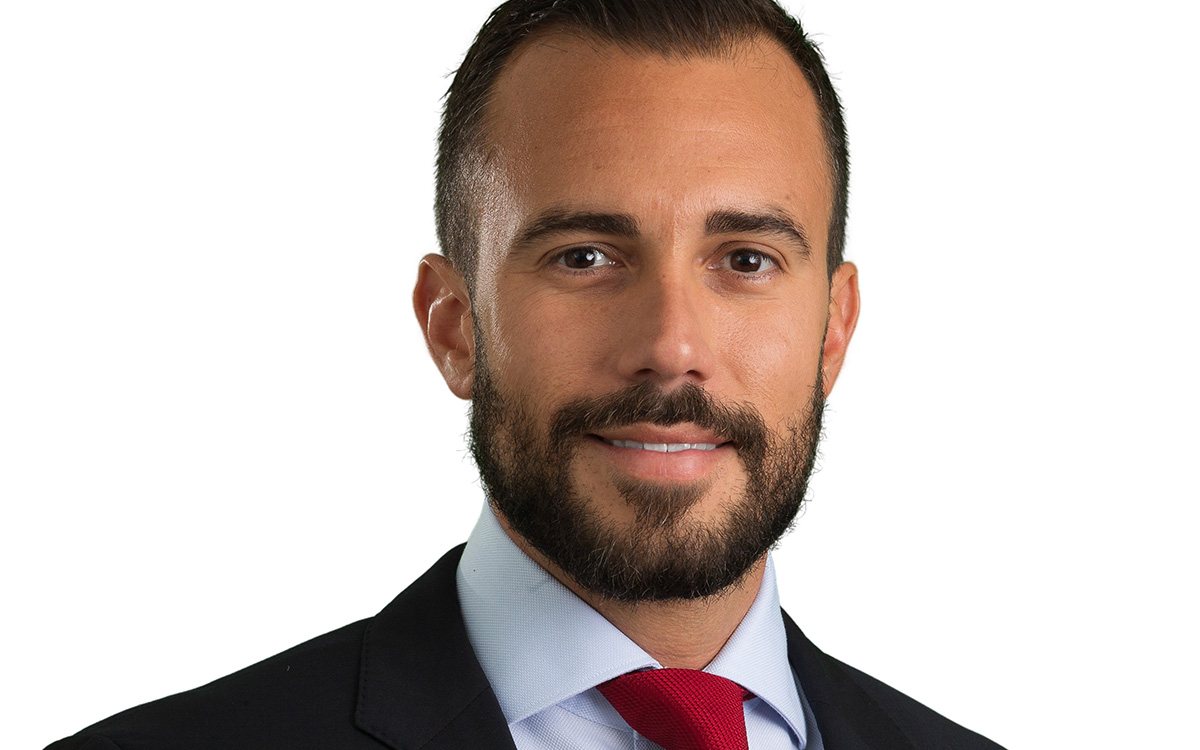
Acting U.S. World Bank Executive Director L. Felice Gorordo recently told the Washington Blade that he is committed to the advancement of LGBTQ and intersex rights within the multilateral organization.
“LGBTQI+ rights are human rights and human rights are LGBTQI+ rights. Period. Hard stop,” he said during an exclusive interview at his D.C. office on March 27. “I see it, personally, from a human rights promotion lens.”
Gorordo, a Cuban American who was born in Miami, graduated from Georgetown University in 2005.
He co-founded Roots of Hope, an organization that seeks to empower young Cubans on the island through entrepreneurship and increased access to technology.
Gorordo served in various roles in both the Obama and George W. Bush administrations, and served as advisor to then-Vice President Joe Biden’s cancer initiative after his mother died from pancreatic cancer.
He has also been the CEO of three-venture backed technology companies, an investor and advisor at two venture capital funds with focuses on global healthcare and infrastructure, and has sat on the boards of several for- and non-profit organizations. Gorordo was most recently the CEO of eMerge Americas and executive director of the Technology Foundation of the Americas before the U.S. Senate confirmed him in May 2023.
He has been the World Bank’s acting U.S. executive director since Adriana Kugler joined the Federal Reserve Board.
Gorordo, 41, throughout the interview referenced the Biden-Harris administration’s 2021 memo that committed the U.S. to promoting LGBTQ and intersex rights abroad as part of U.S. foreign policy.
“It starts off with us at the bank trying to build demand for the issues related to LGBTQI+ rights and people,” he said. “It’s about protecting LGBTQI+ rights in and outside of World Bank operations and projects and supporting LGBTQI+ people and rights inside and outside of our projects through inclusion. It’s using our voice and vote at every chance that we get to advance LGBTQI+ people.”
Gorordo pointed out his office reviews roughly 700 projects a year for the World Bank, and they have an average of $90-$100 billion in financial commitments. He said there is a “pretty extensive review process for due diligence” with criteria that include environmental and social frameworks and bank safeguards (that currently do not explicitly include sexual orientation or gender identity.)
“We take a critical lens at each one that it lives up to the values that we want to promote, and that includes looking at it through the lens of LGBTQI+ rights,” said Gorordo.
One LGBTQ-inclusive project is the World Bank International Finance Corporation’s $275 million loan to Banco Davivienda in Colombia, which provides funding for advisory services to LGBTQ and intersex people and for the design of LGBTQ and intersex banking products. The board in 2023 greenlighted $200 million for the Program for Universal Primary Healthcare Coverage and Resilience which, among other things, seeks to improve the quality of healthcare that LGBTQ and intersex people receive in Chile.
The World Bank’s EQOSOGI Project has already collected LGBTQ- and intersex-specific data on legal gaps as well as practices that impact LGBTQ and intersex people in 16 countries, and it plans to expand its work to other nations in 2024. The World Bank is also expanding its research on the economic costs of discrimination based on sexual orientation and gender identity.
The first studies focused on Serbia and North Macedonia, and found both countries’ annual gross domestic product would increase by .6 percent if LGBTQ and intersex people faced less discrimination in the workplace. A study that will focus on Brazil will be released later this year.
“There’s always more we can do,” Gorordo told the Blade. “What we believe we need to do, again, using our convening power and our voice and our vote is to help build because in the end we are still a demand-driven organization.”
“We need to use our research and the data, in my opinion, our opinion, to help generate the demand for LGBTQI rights to be enshrined in our safeguards, in our strategies and in every single one of our products and the data speaks for itself,” he added.
Gorordo also noted the bank in the coming months will release a new gender strategy that recognizes gender as nonbinary.
“That’s a big step,” he said.
Gorordo described World Bank President Ajay Banga as “a champion of the rights of all, including LGBTQI+ people.” Gorordo, however, acknowledged there has been “some pushback from certain constituencies that have different views and opinions than ours” on the new gender strategy and support for LGBTQ and intersex rights.
“I see it as my responsibility to not just advocate for it in the board room or with management, but also using my office and chair to meet with other chairs bilaterally, to make the case for it, to try and bring folks along with us,” he added.
Uganda’s Anti-Homosexuality Act ‘needs to be struck down and repealed’
The World Bank last August suspended new loans to Uganda in response to the country’s Anti-Homosexuality Act that President Yoweri Museveni signed.
Uganda’s Constitutional Court earlier this month refused to nullify the law. A group of Ugandan LGBTQ activists have appealed the ruling.
“The law needs to be struck down and repealed. Hard stop,” said Gorordo. “We continue to advocate for that.”
Then-World Bank President Jim Yong Kim in 2014 postponed a $90 million loan to the Ugandan government in response to Museveni’s decision to sign a nearly identical version of the Anti-Homosexuality Act, known as the “Kill the Gays” law that imposed a life sentence upon anyone found guilty of repeated same-sex sexual acts.
Uganda’s Constitutional Court later struck down the law on a technicality, but Kim’s decision to postpone the loan without first consulting the World Bank’s board sparked widespread criticism among board members. Advocacy groups had asked the World Bank not to fund future projects in Uganda, but they did not ask for the cancellation of existing loans.
The World Bank earlier this year organized a seminar with the Human Rights Promotion Forum of Uganda that upwards of 50 people attended virtually and in person.
“One of the things that I think is incredibly critical is hearing directly from those we seek to serve and who are being impacted by these discriminatory laws,” said Gorordo.
Gorordo said the World Bank in lieu of the law’s repeal has “been doing a review of mitigation efforts” that includes “a three-month trial period once there is an agreement of what those mitigation efforts would be, to see if they are fit for purpose.”
“At the crux of it includes the protection as well as the equal access of benefits for LGBTQ communities in Uganda. If it is not fit for purpose, then we have to go back to the drawing board., So we will continue to push for the strictest mitigation measures that can be put into place, a very critical review through that process … and ensuring that we are able to guarantee equal access and protection for the LGBTQ community.”
Ghanaian President Nana Akufo-Addo has delayed a decision on whether he will sign a bill that would further criminalize LGBTQ people in his country. Lawmakers in Kenya and Tanzania have proposed similar measures.
“One of the reasons why we’ve taken such a critical view of the Uganda case is this is potentially one of many of these types of cases that we’ll have to deal with,” said Gorordo. “What we do in Uganda could have a ripple effect in other countries and we need to ensure that we are setting the right precedents for how we react in these cases.”
Gorordo further noted consensual same-sex sexual relations remain criminalized in upwards of 60 countries around the world.
“The discrimination that’s against LGBTQI+ people is unacceptable across the board,” he said. “We will use all the tools in the U.S. government’s toolbox to be able to make it known our objection and to try and stop discrimination and protect the rights of LGBTQ+ people every chance we get.”
Federal Government
4th Circuit rules gender identity is a protected characteristic
Ruling a response to N.C., W.Va. legal challenges
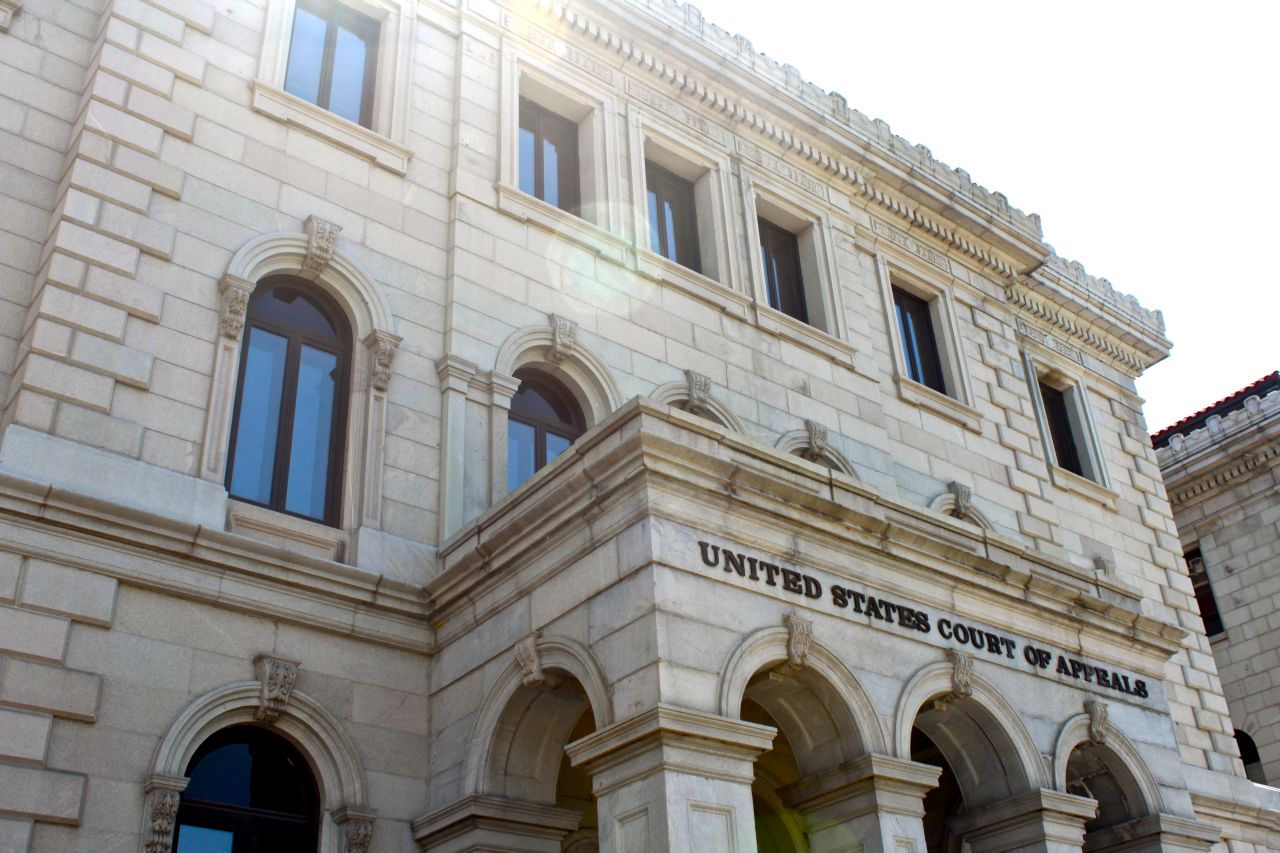
BY ERIN REED | The 4th U.S. Circuit Court of Appeals ruled Monday that transgender people are a protected class and that Medicaid bans on trans care are unconstitutional.
Furthermore, the court ruled that discriminating based on a diagnosis of gender dysphoria is discrimination based on gender identity and sex. The ruling is in response to lower court challenges against state laws and policies in North Carolina and West Virginia that prevent trans people on state plans or Medicaid from obtaining coverage for gender-affirming care; those lower courts found such exclusions unconstitutional.
In issuing the final ruling, the 4th Circuit declared that trans exclusions were “obviously discriminatory” and were “in violation of the equal protection clause” of the Constitution, upholding lower court rulings that barred the discriminatory exclusions.
The 4th Circuit ruling focused on two cases in states within its jurisdiction: North Carolina and West Virginia. In North Carolina, trans state employees who rely on the State Health Plan were unable to use it to obtain gender-affirming care for gender dysphoria diagnoses.
In West Virginia, a similar exclusion applied to those on the state’s Medicaid plan for surgeries related to a diagnosis of gender dysphoria. Both exclusions were overturned by lower courts, and both states appealed to the 4th Circuit.
Attorneys for the states had argued that the policies were not discriminatory because the exclusions for gender affirming care “apply to everyone, not just transgender people.” The majority of the court, however, struck down such a claim, pointing to several other cases where such arguments break down, such as same-sex marriage bans “applying to straight, gay, lesbian, and bisexual people equally,” even though straight people would be entirely unaffected by such bans.
Other cases cited included literacy tests, a tax on wearing kippot for Jewish people, and interracial marriage in Loving v. Virginia.
See this portion of the court analysis here:
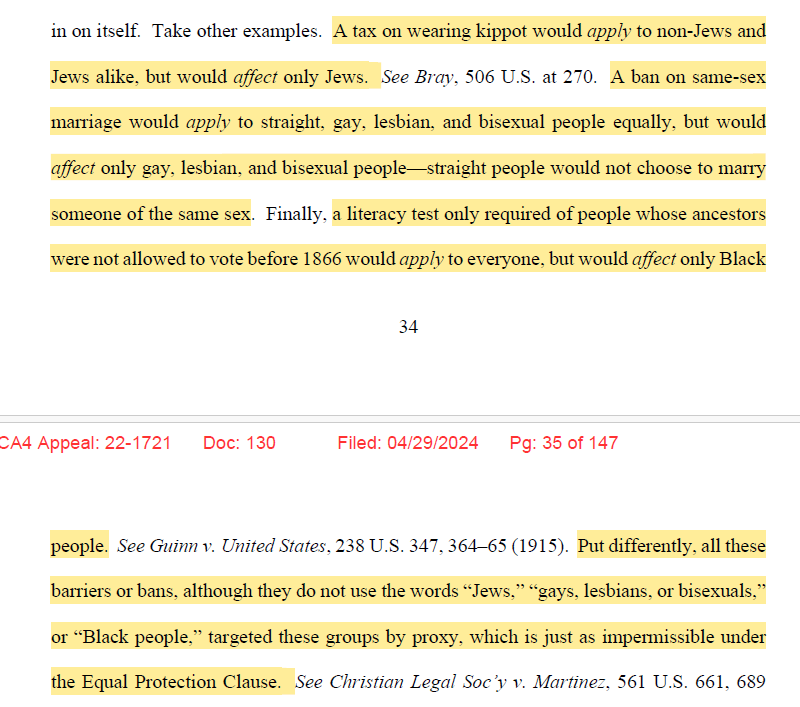
Of particular note in the majority opinion was a section on Geduldig v. Aiello that seemed laser-targeted toward an eventual U.S. Supreme Court decision on discriminatory policies targeting trans people. Geduldig v. Aiello, a 1974 ruling, determined that pregnancy discrimination is not inherently sex discrimination because it does not “classify on sex,” but rather, on pregnancy status.
Using similar arguments, the states claimed that gender affirming care exclusions did not classify or discriminate based on trans status or sex, but rather, on a diagnosis of gender dysphoria and treatments to alleviate that dysphoria.
The majority was unconvinced, ruling, “gender dysphoria is so intimately related to transgender status as to be virtually indistinguishable from it. The excluded treatments aim at addressing incongruity between sex assigned at birth and gender identity, the very heart of transgender status.” In doing so, the majority cited several cases, many from after Geduldig was decided.
Notably, Geduldig was cited in both the 6th and 11th Circuit decisions upholding gender affirming care bans in a handful of states.
The court also pointed to the potentially ridiculous conclusions that strict readings of what counts as proxy discrimination could lead to, such as if legislators attempted to use “XX chromosomes” and “XY chromosomes” to get around sex discrimination policies:
Importantly, the court also rebutted recent arguments that Bostock applies only to “limited Title VII claims involving employers who fired” LGBTQ employees, and not to Title IX, which the Affordable Care Act’s anti-discrimination mandate references. The majority stated that this is not the case, and that there is “nothing in Bostock to suggest the holding was that narrow.”
Ultimately, the court ruled that the exclusions on trans care violate the Equal Protection Clause of the Constitution. The court also ruled that the West Virginia Medicaid Program violates the Medicaid Act and the anti-discrimination provisions of the Affordable Care Act.
Additionally, the court upheld the dismissal of anti-trans expert testimony for lacking relevant expertise. West Virginia and North Carolina must end trans care exclusions in line with earlier district court decisions.
The decision will likely have nationwide impacts on court cases in other districts. The case had become a major battleground for trans rights, with dozens of states filing amicus briefs in favor or against the protection of the equal process rights of trans people. Twenty-one Republican states filed an amicus brief in favor of denying trans people anti-discrimination protections in healthcare, and 17 Democratic states joined an amicus brief in support of the healthcare rights of trans individuals.
Many Republican states are defending anti-trans laws that discriminate against trans people by banning or limiting gender-affirming care. These laws could come under threat if the legal rationale used in this decision is adopted by other circuits. In the 4th Circuit’s jurisdiction, West Virginia and North Carolina already have gender-affirming care bans for trans youth in place, and South Carolina may consider a similar bill this week.
The decision could potentially be used as precedent to challenge all of those laws in the near future and to deter South Carolina’s bill from passing into law.
The decision is the latest in a web of legal battles concerning trans people. Earlier this month, the 4th Circuit also reversed a sports ban in West Virginia, ruling that Title IX protects trans student athletes. However, the Supreme Court recently narrowed a victory for trans healthcare from the 9th U.S. Circuit Court of Appeals and allowed Idaho to continue enforcing its ban on gender-affirming care for everyone except the two plaintiffs in the case.
Importantly, that decision was not about the constitutionality of gender-affirming care, but the limits of temporary injunctions in the early stages of a constitutional challenge to discriminatory state laws. It is likely that the Supreme Court will ultimately hear cases on this topic in the near future.
Celebrating the victory, Lambda Legal Counsel and Health Care Strategist Omar Gonzalez-Pagan said in a posted statement, “The court’s decision sends a clear message that gender-affirming care is critical medical care for transgender people and that denying it is harmful and unlawful … We hope this decision makes it clear to policy makers across the country that health care decisions belong to patients, their families, and their doctors, not to politicians.”
****************************************************************************

Erin Reed is a transgender woman (she/her pronouns) and researcher who tracks anti-LGBTQ+ legislation around the world and helps people become better advocates for their queer family, friends, colleagues, and community. Reed also is a social media consultant and public speaker.
******************************************************************************************
The preceding article was first published at Erin In The Morning and is republished with permission.







